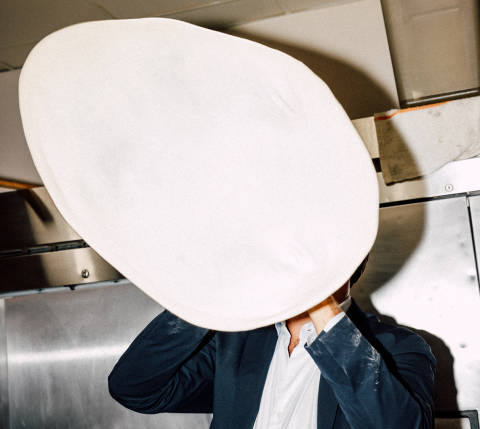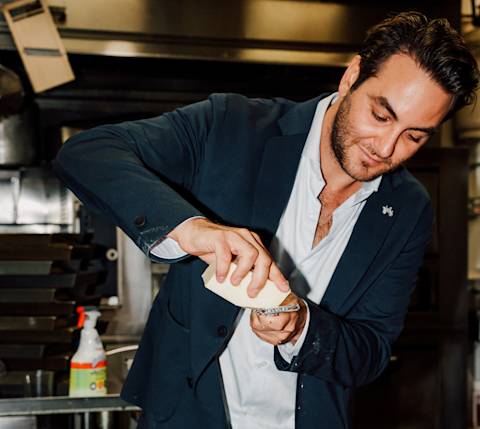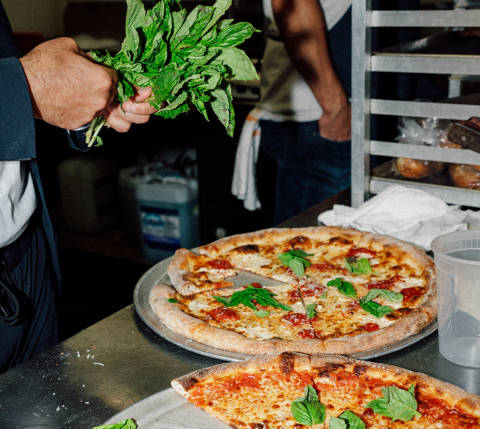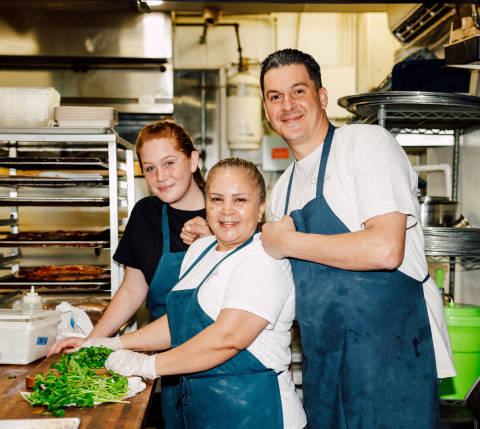While there is a long history of restaurateurs making a name in New York before opening up a flashy outpost in Miami, David Foulquier’s career is a case study in how this trajectory can be reverse engineered with swagger. Originally from Manhattan, he moved to Miami for school, and, in 2015, opened Fooq’s, where he translated his Persian-French heritage into an inventive menu and intimate vibe that breathed fresh life into Downtown’s once sleepy Arts & Entertainment District.
Just 24 at the time, Foulquier went on to start We All Gotta Eat, a restaurant group run with his brother Josh, and in 2018 they unveiled a drastically different concept in New York: Sushi Noz, a hushed temple of high-end sushi, which won a Michelin star, and in 2021 expanded into Noz 17.
Back in Miami, meanwhile, he has remained as restless as ever. When the pandemic put a kibosh on shoulder-to-shoulder dining, he shuttered Fooq’s, reinventing the space as Eleventh Street Pizza, a fast-casual spot specializing in New York-style pies, which will soon open a second outpost in the Downtown Dadeland development.
Here Foulquier talks about his balancing act between cities and cuisines, Miami’s evolving culinary culture, and reviving the spot that started it all.

Walk us through how you got started in the restaurant industry.
I got into this business with a love for food and a love for hospitality—with my Persian and French roots guiding me on how to host people and feed people. I started cooking very young, with my grandparents on both sides of the family, and then took cooking classes in high school to learn the basics. I went to the University of Miami, but ended up transferring to FIU for hospitality.
I recommend anybody who's thinking about opening a restaurant to go to hospitality school; it wasn’t a waste of my time.
How so, exactly?
Working in the kitchen I was able to learn a lot, but I also got to do different kinds of studies, the business side of things. Everything from accounting to legal to marketing to understanding food costs, labor costs, knowing the food chain. It’s important to do your homework when opening a restaurant.
We have to make money and also be able to put food on our tables and be able to survive mentally.
A lot of that is just putting yourself in good positions: not signing bad deals, not working on concepts that are a waste of your time, not taking on partners that aren’t good for you.
How did those lessons play into you opening Fooq’s?
We were lucky to come across the space where I didn’t have to put up a big crazy security deposit. So it was obviously still a risk, but it wasn't like it was going to be a career-ender if it didn't work out, which was super important. I remember when I read Danny Meyer’s book, Setting the Table, he said to start small with one location, get that right, and then start to expand. I always knew that I wanted to make this my career—and I had big aspirations—but we spent three years exclusively working on Fooq’s before we opened up Sushi Noz.

Do you think some people in this city open without doing their homework?
Miami used to be a market where, historically, you were able to come in at a lower level in terms of rent, responsibilities, and aggressive landlords. But now Miami is also filled with sharks, so that filters out the people who are maybe not doing as good of a job. I’m definitely proud of Miami’s food scene. I can recommend dozens of places to people and not be worried about what they’re going to find.
And that wasn’t always the case?
Not even in the last five years. The pandemic kicked us into gear. We inherited a lot of passionate industry workers, people from the major cities who were fed up with being overworked and underpaid and living in places that really were not that great for their mental health.
But the pandemic also forced you to close Fooq’s, your baby, and turn it into Eleventh Street Pizza. Now you’re about to open a second location. Did you ever imagine yourself as a pizza shop owner?
Being a New York City kid, pizza is such a part of your life, but that pizza culture didn’t really exist in Miami. So I taught myself how to make great pizza with sourdough, a trial and error situation that cost me a lot of weight gain. There was a point where I was eating 20 to 30 slices a day. It’s opened my eyes to the whole world of baking and breads. I hope to open more pizza joints and incorporate bread making into our restaurants.

To an outsider, there seems to be little connection between grabbing a slice of pizza on the fly and sitting down to an epic sushi feast. What’s the link between them to you?
We just want to be the best. That’s our mission statement as a restaurant group.
It doesn't matter what it is that we're doing, whether it’s a fast casual pizza shop or a $500 per person omakase in the hardest city in the world, we want it to be the best.
Would you ever open a Sushi Noz here in Miami?
The big fear in Miami has always been: Are you going to get people to spend the big bucks in the slow months? Now it’s more of a 365 days-a-year business model. While we don’t have any direct plans at the moment—our next location is in L.A.—one day there will be a Sushi Noz here.

And what about Fooq’s? I understand it’s coming back.
It’s in the works! It’s definitely different from the little bistro it was—we’re expanding to a larger space and we’re excited to be able to express ourselves culinary-wise. We’ll have a proper liquor license so now we can serve cocktails. But there are a whole host of other costs that come with building a 200-plus seat restaurant, which is what I’m learning now.
One day you’ll write your own book of hospitality hacks.
Once the pizza stops tasting as good to me, maybe I’ll start writing.
About Secret Menu
We created Secret Menu, a print and digital magazine from DoorDash, on the belief that one restaurant’s story can help or inspire another. We’re proud to elevate stories that connect local restaurant communities and celebrate the craft and ingenuity that makes them so vibrant here on the Merchant Blog. Read more Secret Menu stories here.





